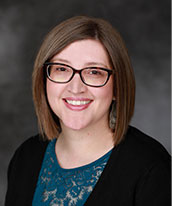Biography
Dr. Liz Legerski is a first-generation college graduate who was born and raised in the Twin Cities of Minnesota. She has been teaching at UND since Fall 2010. She earned tenure and was promoted to Associate Professor Fall 2017. She has served as the Chair of the University Senate from 2020-2021 and as the Faculty Advisor to the North Dakota State Board of Higher Education from 2020-2022.
Dr. Legerski teaches courses such as Soc 306: Social Movements and Change, Soc 326: Sociological Statistics, Soc 355: Drugs & Society, Soc 436: Social Inequality, Soc 475: Sociology Capstone, and Soc 540: Seminar in Social Policy.
Dr. Legerski's research interests include gender, social inequality, families, social policy, sexual harassment and interpersonal violence. She is particularly interested in the way family characteristics, employment opportunities, social policies, and cultural and political forces shape the lives of low-income, working-class, and other marginalized families.
Dr. Legerski's research has been published in journals such as the Journal of Interpersonal Violence, Social Forces, Gender & Society, Sex Roles, the Journal of GLBT Family Studies, Health Sociology Review, Sociological Inquiry, the Social Science Journal, and Women’s Health Issues.
Lydia & Arthur Saiki Faculty Award for Excellence in Service, UND Foundation, February 17, 2022.
Itterman Faculty Professional Development Award, UND College of Arts & Sciences, May 18, 2021.
Ph.D., Sociology, University of Kansas, Aug. 2010. Dissertation Title: “Hierarchies of Risk: The Longitudinal Dynamics of Family, Work, Welfare, and Health Insurance in Low-Income Women’s Lives.” Honors.
M.S., Sociology, Brigham Young University, Aug. 2004. Thesis Title: “Women’s Response to Spousal Unemployment: Gender, Family, and Labor Market Constraints.”
B.S., Sociology, Research and Analysis emphasis, Brigham Young University, Dec. 2002. Cum Laude.
Dr. Legerski is a mixed-methodologist who has utilized quantitative research techniques such as survey construction and secondary data analysis, as well as qualitative research methods such as in-depth interviews. She enjoys working on collaborative, multi-disciplinary projects and has been awarded research grants from regional organizations such as the Midwest Sociological Society as well as federal organizations such as the National Institute of Justice.
